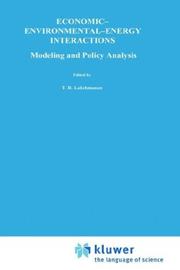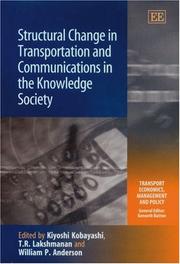| Listing 1 - 10 of 10 |
Sort by
|
Article
Year: 2007 Publisher: Paris : OECD Publishing,
Abstract | Keywords | Export | Availability | Bookmark
 Loading...
Loading...Choose an application
- Reference Manager
- EndNote
- RefWorks (Direct export to RefWorks)
Economic contributions of investments of transport infrastructure are typically assessed from a microeconomic perspective, which tries to identify the link between specific transport infrastructure improvements and the productivity of specific production units. The traditional economic tool of the microeconomic perspective is cost benefit analysis (CBA), an ex ante tool which tries to capture the benefits of time and cost savings --- as well as further gains from logistical improvements and facilities consolidation made possible by transport improvements --- and the associated costs including external costs. The objective of this Round Table sponsored by OECD / ECMT and Boston University is to identify and move towards methods which incorporate the wider economic benefits of transport infrastructure, not typically captured in the CBA estimates of benefits and costs. The aim of this brief paper is to offer an overview of such wider economic benefits ensuing from transport infrastructure investments.
Book
ISBN: 1280348844 9786610348848 Year: 2001 Publisher: Washington, DC : World Bank,
Abstract | Keywords | Export | Availability | Bookmark
 Loading...
Loading...Choose an application
- Reference Manager
- EndNote
- RefWorks (Direct export to RefWorks)
Trade blocs --- Transportation --- International economic integration
Article
Year: 2007 Publisher: Paris : OECD Publishing,
Abstract | Keywords | Export | Availability | Bookmark
 Loading...
Loading...Choose an application
- Reference Manager
- EndNote
- RefWorks (Direct export to RefWorks)
Economic contributions of investments of transport infrastructure are typically assessed from a microeconomic perspective, which tries to identify the link between specific transport infrastructure improvements and the productivity of specific production units. The traditional economic tool of the microeconomic perspective is cost benefit analysis (CBA), an ex ante tool which tries to capture the benefits of time and cost savings --- as well as further gains from logistical improvements and facilities consolidation made possible by transport improvements --- and the associated costs including external costs. The objective of this Round Table sponsored by OECD / ECMT and Boston University is to identify and move towards methods which incorporate the wider economic benefits of transport infrastructure, not typically captured in the CBA estimates of benefits and costs. The aim of this brief paper is to offer an overview of such wider economic benefits ensuing from transport infrastructure investments.

ISBN: 0898380235 9400987412 9400987390 Year: 1980 Publisher: Boston (Mass.) : Nijhoff,
Abstract | Keywords | Export | Availability | Bookmark
 Loading...
Loading...Choose an application
- Reference Manager
- EndNote
- RefWorks (Direct export to RefWorks)
Environmental protection. Environmental technology --- Relation between energy and economics --- 330.115 --- Economic policy --- -Energy policy --- -Environmental policy --- -Environment and state --- Environmental control --- Environmental management --- Environmental protection --- Environmental quality --- State and environment --- Environmental auditing --- Energy and state --- Power resources --- State and energy --- Industrial policy --- Energy conservation --- Economic nationalism --- Economic planning --- National planning --- State planning --- Economics --- Planning --- National security --- Social policy --- Econometrie --- Mathematical models --- -Congresses --- Government policy --- Energy policy --- Environmental policy --- Congresses. --- -Econometrie --- 330.115 Econometrie --- -330.115 Econometrie --- Environment and state --- Mathematical models&delete& --- Congresses
Article
Abstract | Keywords | Export | Availability | Bookmark
Book
ISBN: 038756490X Year: 1993 Publisher: New York Springer-Verlag
Abstract | Keywords | Export | Availability | Bookmark
 Loading...
Loading...Choose an application
- Reference Manager
- EndNote
- RefWorks (Direct export to RefWorks)

ISBN: 1843766108 9781843766100 Year: 2006 Publisher: Cheltenham Elgar
Abstract | Keywords | Export | Availability | Bookmark
 Loading...
Loading...Choose an application
- Reference Manager
- EndNote
- RefWorks (Direct export to RefWorks)
Article
Year: 2007 Publisher: Paris : OECD Publishing,
Abstract | Keywords | Export | Availability | Bookmark
 Loading...
Loading...Choose an application
- Reference Manager
- EndNote
- RefWorks (Direct export to RefWorks)
Assessments of the economic benefits of transportation infrastructure investments are critical to good policy decisions. At present, most such assessments are based of two types of studies: micro-scale studies in the form of cost-benefit analysis (CBA) and macro-scale studies in the form of national or regional econometric analysis. While the former type takes a partial equilibrium perspective and may therefore miss broader economic benefits, the latter type is too widely focused to provide much guidance concerning specific infrastructure projects or programs. Intermediate (meso-scale) analytical frameworks, which are both specific with respect to the infrastructure improvement in question and comprehensive in terms of the range of economic impacts they represent, are needed. This paper contributes to the development of meso-scale analysis via the specification of a computable general equilibrium (CGE) model that can assess the broad economic impact of improvements in transportation infrastructure networks. The model builds on recent CGE formulations that seek to capture the productivity penalty on firms and the utility penalty on households imposed by congestion (Meyers and Proost, 1997; Conrad, 1997) and others that model congestion via the device of explicit household time budgets (Parry and Bento, 2001, 2002). The centerpiece of our approach is a representation of the process through which markets for non-transport commodities and labor create derived demands for freight, shopping and commuting trips. Congestion, which arises due to a mismatch between the derived demand for trips and infrastructure capacity, is modeled as increased travel time along individual network links. Increased travel time impinges on the time budgets of households and reduces the ability of transportation service firms to provide trips using given levels of inputs. These effects translate into changes in productivity, labor supply, prices and income. A complete algebraic specification of the model is provided, along with details of implementation and a discussion of data resources needed for model calibration and application in policy analysis.
Article
Year: 2007 Publisher: Paris : OECD Publishing,
Abstract | Keywords | Export | Availability | Bookmark
 Loading...
Loading...Choose an application
- Reference Manager
- EndNote
- RefWorks (Direct export to RefWorks)
Assessments of the economic benefits of transportation infrastructure investments are critical to good policy decisions. At present, most such assessments are based of two types of studies: micro-scale studies in the form of cost-benefit analysis (CBA) and macro-scale studies in the form of national or regional econometric analysis. While the former type takes a partial equilibrium perspective and may therefore miss broader economic benefits, the latter type is too widely focused to provide much guidance concerning specific infrastructure projects or programs. Intermediate (meso-scale) analytical frameworks, which are both specific with respect to the infrastructure improvement in question and comprehensive in terms of the range of economic impacts they represent, are needed. This paper contributes to the development of meso-scale analysis via the specification of a computable general equilibrium (CGE) model that can assess the broad economic impact of improvements in transportation infrastructure networks. The model builds on recent CGE formulations that seek to capture the productivity penalty on firms and the utility penalty on households imposed by congestion (Meyers and Proost, 1997; Conrad, 1997) and others that model congestion via the device of explicit household time budgets (Parry and Bento, 2001, 2002). The centerpiece of our approach is a representation of the process through which markets for non-transport commodities and labor create derived demands for freight, shopping and commuting trips. Congestion, which arises due to a mismatch between the derived demand for trips and infrastructure capacity, is modeled as increased travel time along individual network links. Increased travel time impinges on the time budgets of households and reduces the ability of transportation service firms to provide trips using given levels of inputs. These effects translate into changes in productivity, labor supply, prices and income. A complete algebraic specification of the model is provided, along with details of implementation and a discussion of data resources needed for model calibration and application in policy analysis.
Digital
ISBN: 0821348841 Year: 2001 Publisher: Washington, D.C. The World Bank
Abstract | Keywords | Export | Availability | Bookmark
 Loading...
Loading...Choose an application
- Reference Manager
- EndNote
- RefWorks (Direct export to RefWorks)
| Listing 1 - 10 of 10 |
Sort by
|

 Search
Search Feedback
Feedback About UniCat
About UniCat  Help
Help News
News